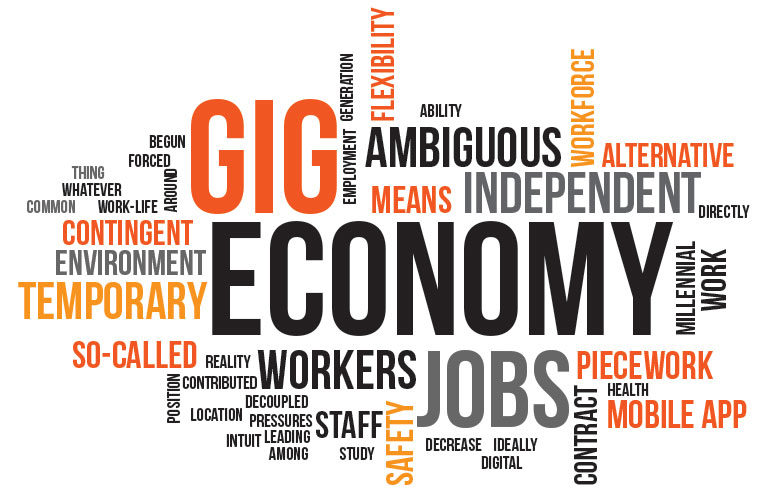Introduction
The Gig economy is transforming the traditional job market, providing flexible work opportunities that reshape how people earn a living. This article explores the rise of the gig economy, its impact on workers and businesses, and what it means for the future of work. If you’re curious about freelance work, side hustles, or the growing trend of independent contracting, keep reading to discover more about this evolving landscape.
What Is The Gig Economy?
The gig economy is a labor market where temporary, flexible jobs are common, and companies hire independent contractors and freelancers instead of full-time employees. Gig workers often take on multiple short-term assignments or “gigs” that allow them to work on their terms. Popular gig economy jobs include freelance writing, ride-sharing (e.g., Uber and Lyft), delivery services, graphic design, virtual assistance, and digital marketing.

Why Is The Gig Economy Growing?
Several factors contribute to the rapid growth of the gig economy:
- Advancements in Technology: With the rise of digital platforms like Upwork, Fiverr, and TaskRabbit, connecting gig workers with employers has never been easier. These platforms facilitate finding short-term projects and enable freelancers to market their skills to a global audience.
- Desire for Work-Life Balance: Many people seek more flexibility in their careers, and the gig economy offers an alternative to the traditional 9-to-5 job. Freelancers can set their schedules, allowing them to pursue hobbies, travel, or spend more time with family.
- Economic Shifts: Companies are increasingly adopting cost-saving measures, and hiring gig workers can be more economical than maintaining a full-time staff. This shift allows businesses to scale their workforce according to demand.
- Entrepreneurial Drive: The gig economy attracts individuals with an entrepreneurial mindset who enjoy the freedom of being their boss and choosing projects that interest them.
The Benefits Of The Gig Economy
The gig economy offers numerous advantages for both workers and businesses:
- Flexibility for Workers: Gig workers can take on assignments based on availability and personal preferences. This flexibility can lead to better work-life balance and increased job satisfaction.
- Diverse Income Streams: Freelancers can earn from multiple sources, reducing dependency on a single income. It also provides an opportunity to explore various fields and diversify skill sets.
- Access to a Global Talent Pool for Businesses: Companies can tap into a worldwide network of freelancers with specific skills, leading to faster project completion and reduced recruitment costs.
The gig economy reduces operational costs for businesses since companies can hire contractors or freelancers for specific tasks without the expenses associated with full-time employees, such as benefits and office space. It allows for agile scaling, enabling companies to expand or reduce their workforce based on project demands quickly. Furthermore, it offers access to a global talent pool, allowing businesses to find specialized skills that might not be available locally.

This shift fosters a culture of innovation, where new tools and services emerge to support independent workers. For many, it provides an opportunity to explore entrepreneurship, turning hobbies or side projects into viable income sources.
The Challenges Gig Workers Face
While the gig economy has its benefits, it also comes with some challenges:
- Job Insecurity: Gig workers lack the stability of traditional employment, with no guaranteed income or job security. Gigs can be inconsistent, leaving freelancers to navigate uncertain periods.
- Lack of Benefits: Unlike full-time employees, gig workers do not receive employee benefits such as health insurance, paid leave, or retirement plans. This absence requires gig workers to manage their financial well-being independently.
- Tax Implications: Freelancers must handle their tax obligations, which may involve higher tax rates and additional paperwork.
- Absence of Legal Protections: Gig workers may lack labor rights, such as minimum wage, protection from unfair termination, or safe working conditions.
- Isolation and Lack of Support: Working independently can result in social isolation and limited access to professional development or networking opportunities.
- Dependence on Platforms: Many gig workers rely heavily on digital platforms that can change fees, algorithms, or terms, affecting their earnings and job availability.
How Businesses Are Embracing The Gig Economy
As the gig economy expands, businesses are finding innovative ways to integrate freelancers into their operations. Here are some ways companies are leveraging gig work:
- Project-Based Hiring: Companies hire freelancers for specific projects or tasks, which allows them to access specialized skills without the commitment of a long-term employment contract.
- Seasonal Work: Businesses with fluctuating demands, such as retail during holiday seasons or hospitality in tourist destinations, rely on gig workers to handle seasonal peaks.
- Remote Work Integration: Many companies hire freelancers for remote tasks like content creation, software development, and customer service, making it easier to adapt to changing needs and technology trends.
Tips For Succeeding In The Gig Economy
If you’re considering joining the gig economy or are already a freelancer looking to thrive, here are some tips for success:
- Build a Strong Online Presence: Create a professional profile on freelancing platforms, showcase your skills, and collect reviews from satisfied clients. Use social media and personal websites to highlight your portfolio and attract more gigs.
- Set Clear Goals and Boundaries: Define your financial and career objectives, and establish boundaries to ensure a balance between work and personal life. It’s essential to avoid burnout by not overcommitting to projects.
- Stay Updated on Industry Trends: As the gig economy evolves, staying informed about trends in your industry can give you a competitive edge. Take online courses to enhance your skills and stay ahead of the curve.
- Manage Finances Wisely: Since gig workers may face irregular income, creating a budget and setting aside savings for lean periods is crucial. Consider consulting a financial advisor to plan for taxes, retirement, and insurance.
Trusted Platforms For Gig Work
- Upwork: Upwork, A popular freelancing platform where businesses can find freelancers for various projects, including writing, graphic design, programming, and more.
- Fiverr: Fiverr, A marketplace for freelancers to offer services starting at $5. It covers a wide range of categories, from digital marketing to creative arts.
- Freelancer: Freelancer is a global freelancing platform where employers can post projects and freelancers can bid on them. It caters to various industries, including IT, design, and writing.
- TaskRabbit: TaskRabbit platform connects people with local freelancers for tasks such as cleaning, moving, and handyman services.
- Gigwalk: Gigwalk mobile app that allows users to find and complete small gigs in their local area, often related to market research and retail audits.
- Toptal: Toptal freelance platform that connects clients with top freelancers in software development, design, and finance, known for its rigorous screening process.
- Thumbtack: Thumbtack service marketplace that connects local professionals with customers for various services, including home improvement, events, and lessons.
- Airbnb: Airbnb is primarily known for vacation rentals, Airbnb also allows hosts to offer unique experiences, providing gig opportunities in hospitality and tourism.
- Rover: Rover platform for pet sitters and dog walkers, connecting pet owners with trusted caregivers.
- Rideshare and Delivery Services: Platforms like Uber, Lyft, DoorDash, and Postmates provide gig opportunities in transportation and food delivery.

The Future Of The Gig Economy
As more people turn to gig work, the traditional employment landscape is changing. The gig economy is expected to continue growing, driven by technological advancements, evolving work preferences, and economic factors. Here are some potential future developments:
- Increased Regulation: Governments may introduce new laws to provide gig workers with more rights and benefits, addressing issues such as job security and fair wages.
- Gig Platforms Evolving: Freelance platforms may expand their services to offer more support for gig workers, such as health benefits, insurance options, and financial planning tools.
- Hybrid Work Models: The gig economy may merge with traditional employment, leading to more hybrid work arrangements where employees take on freelance projects alongside their primary jobs.
Conclusion
The rise of the gig economy marks a significant shift in how people work and how businesses operate. While it offers flexibility and opportunities for workers and employers, challenges such as job security and benefits must be addressed. As we move forward, the gig economy will likely continue to shape the future of work, offering new ways to achieve financial independence and career satisfaction.
Whether you’re a freelancer or a business looking to hire gig workers, understanding the dynamics of the gig economy can help you navigate this evolving landscape successfully.






